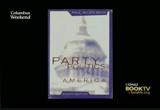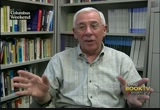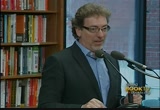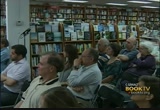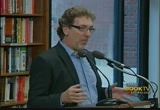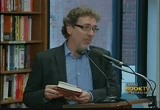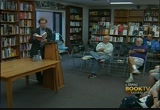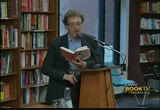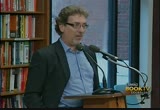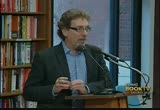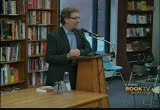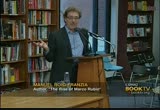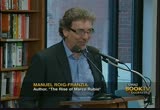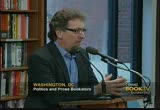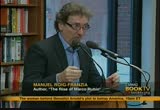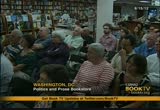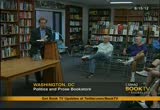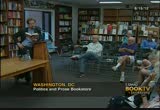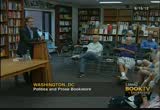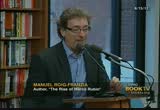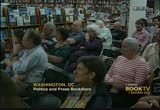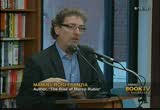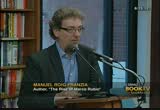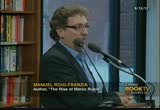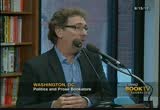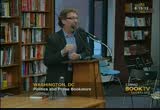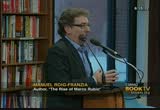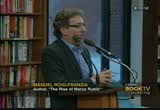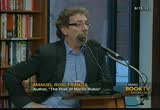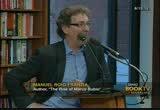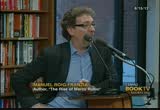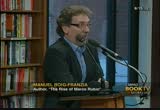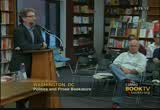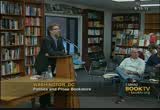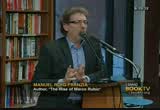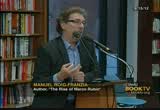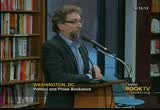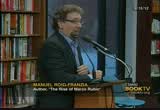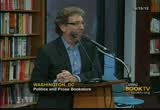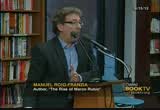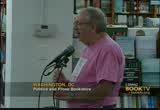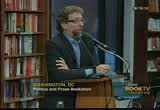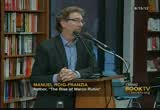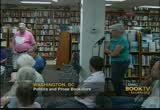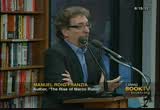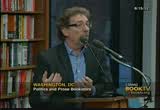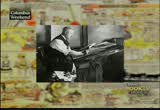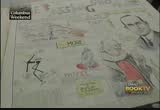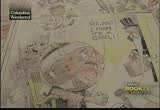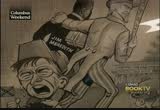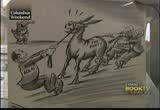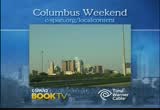tv Book TV CSPAN September 2, 2012 7:00am-8:00am EDT
7:00 am
>> do you foresee ohio always being an important state in presidential elections? >> i think for the foreseeable future yes. ohio is not growing as fast as other states, which means our electoral college weight is going to decline over time. we lost congressional seats most recent reapportionment of congressional seats. and that will probably continue to happen since there is direct growth elsewhere than it is in ohio. the sun belt states tend to be growing, although the recession has hurt them in terms of the growth. so as long as we're significant in the electoral college, and particularly as long as we're competitive we will be a battleground state. candidates will be coming here. they will be saying i have to win ohio, if i'm going to win the presidency. i think both of these candidates this year probably have to win
7:01 am
ohio. and so they will go out it in ohio, spent a lot of money and be here. >> for more information on booktv's recent visit to columbus, ohio, and other cities on c-span's local content vehicles tour visit c-span.org/local content. >> i would like to thank brad for the very generous introduction. i think it's good that he mentioned that i'm a writer for the "washington post," do is make predictions. right? we're dealing with the things we've come across and are not guessing. so of course i'd like to start off tonight by making a prediction. and that is that it's highly
7:02 am
likely that the first latino president of the united states has been born. now, he could be, or she could be, an infant right now, or in second grade, or in high school, or maybe even in the united states senate. but it's clear from looking at the united states and the changes in our demography that latinos will continue to play a larger role in national dialogue. if you look at the specifics, in 2004, 7.6 million latinos are said to have voted in the united states. that's according to research that's been done at the national level. in 2008 in a presidential election, that jumped up to
7:03 am
9.7 million. now there are estimates that in this coming election in november, that the number could go all the way up to as high as 12 million. and that number is only going to grow, so i think it makes it all the more relevant to examine the life of somebody like marco rubio. in some respects i kind of think of him a little bit as almost a test case for how the american population relates to a latino politician. that was reason enough for me to write a book about him. because in the same way that you look at the reasons why you want to write a newspaper article, i think you also have to ask that question when you're setting out to write a book.
7:04 am
and i've come up with three answers. one was the answer that i had when i first thought about doing the book. i know the is one that kind of evolved while i was working on it, and the third is one that sort of came to mind afterwards. and there were differences but i think that you they are not mutually exclusive. so what was the first answer to the question? the first answer was that this guy has probably better prospects of going to what we would call little help on the, the casablanca, or the white house, then any american latino politician in our history. and so i decided that i would read a few things for you, to you that kind of illustrate each of these three answers.
7:05 am
it's i think i'll start with answer number one. >> and this took place in august 2010. for an instant, she hurtled toward the floor, a slender, delicate right shoulder nights downward. a teen flick sideways. nancy reagan, fragile as a china figurine and an ivory colored suit was crashing. many in the crowd couldn't see what was happening. they clapped lovingly, oblivious. but before the applause gateway to gasp, a synopsis of the young senator the former first lady to her seat fired perfectly. marco rubio, his hair parted just so, a valedictorian smile on her state to the aging icon toward him.
7:06 am
he leaned right, swung and buried her left arm, calling the 90 euros just as she slanted forward, almost parallel to the floor and balanced for a bone chip in the. rubio, a 40 year old who looked a decade younger, moved with a sure agility that the once flashed on the high school football field of miami. he wasn't fast, but he was quick and high school athletic director james always thought. on the football field there's a distance. fast means you run at high speeds. quick mean she react at high speed. quick and you get to the right spot on the field at precisely the right time. sometimes being greek is better than being fast. it was august 23, 2011, the figurine didn't shatter. soon it was clear this was a moment. the los angeles times blog
7:07 am
published frame by frame sequence of photographs beneath the headlines, marco rubio to the rescue. they should nancy and mark a smiling at each other, and the nancy happily looking into the audience, then starting a slow motion as the sender reaches over to pat her hand. then rubio saving a. the former first lady's anxiety at that second written on her face as she grimaces and closes her eyes. conservative bloggers and their leaders have been reliably lauded to her about all things revealed during his quick descent into the republican party, praised him. hero, marco rubio, saves a falling nancy reagan. that happened a couple of weeks before simon & schuster called me, and i can member watching it on television that night. it was on the evening news or i
7:08 am
think -- on the evening news. i think sometimes political careers are aided by the center piece of timing. and being there when this icon of the conservative movement happened to trip with the cameras rolling, it's just another example of how marco rubio has been in the right place at the right time throughout his political career. he ran for the united states senate when nobody thought that he had any chance, but he really had the good fortune of running in a three-person race. and and politics it's great to run any three-person race because it splits the electorate. and marco rubio became the conservative choice in florida. charlie crist had been a governor, very powerful. everyone thought that he was in the civil.
7:09 am
and he was running as a republican, but rubio was starting to make inroads and crist dropped out. kendrick was a democrat, african-american from northern florida, he was in the race, too, and all three of them being there benefited marco rubio. because marco rubio was able to present himself as the most conservative voice in florida, recent charlie crist is someone who, as he was called in newspaper articles, the most liberal republican governor in the united states, and when crist decided to run as an independent, all of the moderates were being split between him and meet. and rubio was able, through espousing attendance of groups like club for growth, really
7:10 am
captured that base. and in the end he ended up winning it by a lot. so all that i knew when i got started on the project. i didn't know a man named pedro victor darcey. pedro victor garcia is marco rubio's grandfather. a name i had never heard before i started research on this project. and brightest mentioned discrepancy about the senators family story of coming after castro, but i also wanted to know about pedro victor garcia because in a few speeches by senator have spoken about him and the big influence he had on his life. and so one of the things you've got to love about washington is we've got lots of little rules.
7:11 am
tiny little rules. and i found out there talking to a bunch of researchers, that if you were born 100 years ago, all of your immigration records are transferred from the immigration service, the uscis, to the national archives. and this may not seem like a big deal to you, but it was a really big deal to me because to get records from the immigration service, you have to make a freedom of information act request. to get records from the national archives much quicker and easier process. so i found out that pedro victor's records were kept at the national archives in kansas city. and i looked up on the internet
7:12 am
randomly the archives -- the archivists name and i called her up and got her on the phone. answered her phone. and she said i am so so busy today, and i was bracing myself because time is of the essence. so busy. and before i could get the word out, she said, yeah, i don't think i'm going to be able to get to those records until after lunch. i don't know, i guess i could wait until after lunch. so she called me back after lunch and told me that she'd found the file that i was looking for, and that she would be happy to overnight it to me. again, i was surprise.
7:13 am
your tax dollars at work. what arrived at my house that next day was a package filled with the documents. and they were wonderful documents for a researcher. and written certificates of birth and confirmation from cu cuba, fascinating stuff to look over. and there were three sheets at the bottom of the almost didn't notice at the time. and then the next morning over coffee, i was looking at the pile again and i realized that these were xeroxes of three photographs, final, final discs. i got to thinking i'm wondering if there's actually a recording that was part of this record. and so i called up the woman who i now called the world's greatest archivist, and i said
7:14 am
just by coincidence, just out of curiosity, is there a vinyl there? and she said oh, yes, but i have no way of listening to it so i said why do i fly to kansas city and bring you a record player? that wasn't going to work out either. i was eventually sent to a laboratory in washington, d.c., and those discs were transferred onto, those records were transferred onto computer disks that i could listen to. and she had asked them to me again. i did not know what was on those recordings. had no idea. and i put it into my computer, and i heard this voice very deadpan voice, a voice that sounded like a new yorker to me. i came to know that this was a
7:15 am
judge. and the next voice i heard was another sort of unsympathetic straightforward voice, who i came to learn was a prosecutor. and the next was this angelic, sweet, almost childlike woman's voice. she is a translator. and then i heard a fourth voice, and that's when i got a lump in my throat. because i realized it was pedro victor garcia. it was this man that i had been studying about, learning about as a way to understand the subject of this biography. and that i come to like. he came to the united states in 1956. he came to the united states in 1956.
7:16 am
the question was, he was born in cuba in 1899, so more than 100 years ago. and the thing about immigration is it doesn't work out for everybody. i mean, we have this american dream, and one of the people it didn't work out for was pedro victor garcia, who came to the united states with seven daughters and a wife, and struggled, could not make a living. and in 1959, after castro took over cuba, he, like a lot of cubans, thought the cube was going to become a better place, and that his options would actually possibly be better in cuba than they were here in the united states. and so he returned. he went back to the island of his birth. and after three years there, and after it had become clear that
7:17 am
cuba was moving toward being a marxist lenin communist state, he did something really risky, and i'll read to you about what he did. beat bear with me for just one moment. i thought i had this marked. he bought an airplane ticket is what he did, and at the airport a guy who wasn't immigration officer stopped pedro victor garcia. and he told him that he didn't belong. it turns out that pedro victor did not have a decent.
7:18 am
because he stayed out of united states for longer than a year, he was viewed to have renounced his residence. and in those days in florida, there's this wonderful building right on biscayne boulevard it's called now the freedom tower. it's modeled after this dutiful belltower in spain. and that was where cubans were being sent to get aid. upon their arrival. but that's not where he was being sent. and this was a place that was called the ellis island of the south. the southern statue of liberty, a symbol and a beacon. but pedro victor garcia, however, wasn't being sent to the beacon. he was being sent up the street to the justice department immigration and naturalization
7:19 am
service office. physically about three miles north of the south new ellis island, symbolically 1 million miles in distance. the building to the south represents welcome. the one to the north tilted more towards -- so was that on october 4, 1962, pedro victor appeared. a kind of immigration judge. pedro victor's hearing was recorded on a machine originally manufactured by the inventor thomas edison's company. to final discs about the size of single phonograph records contained audio of the proceedings. now full of scratches and audible pops. the records are a remarkable artifact of another era.
7:20 am
and 33 minutes of testimony, they tell the story of a man caught in immigration no man's land. a lesson about the laws that decide who gets to stay in the united states, and who must go. signor, -- [speaking spanish] >> the translator instructed, sir, raise your right hand. i swear, garcia, said in spanish, his voice a low rumble. the voice writer record, pedro victor sounds calm and respectful. the product of the three cigars a day habit he was maintaining. he answers plaintively when asked if he belongs a political party in cuba. we don't have political parties. he said.
7:21 am
so pedro victor really became kind of a guiding spirit for me when writing on this blog. so you probably know how this period in the. it ended with pedro victor being deported from the united states, and he really caught a break. because in those days you were not necessarily put on a plane and sent back right away. you were ordered to leave, and you expected to do so. and here's how he got lucky. a few days after this hearing, and maybe this was kind of thought about this before, but i talk a lot about -- have a good time. this man who was born under a thatched palm roof in rural cuba, his mother was the literate, had polio when he was a child, had good timing when he came to being ordered deported,
7:22 am
and what happened was that a few days after that order, the united states announced that there were missiles on the island of cuba. and the cuban missile crisis was on. and nobody would've gone on an airplane to go to cuba, deported or ordered, not deported. and the reason for that is that all the airports were closed. but for the next five years, pedro victor lived in the united states on a status that a lot of people live in the united states right now. he had no documents to say that he could be. it wasn't until 1967 when the climate had changed and a law that have been passed a year before, that he was able to appeal for residency again, and
7:23 am
this time he got it. so in some respects it has a bit of a happy ending. but it had to been an incredibly traumatic experience at the time. and i think that's one of the reasons why i kept a picture of him on my desk while i was working on this, because have really felt i got him. and so quickly i will just give you the third caption, and we can take some questions. so thank you for listening. the third answer to my question about why marco rubio, and why now, and why do this book came, after the book was published. you know, prior to publication marco rubio had begun to talk about an alternative dream act. and the d.r.e.a.m. act is a proposal that has never been passed but is really a symbolic, it's a symbolic, more than a
7:24 am
talking point. it's really a rallying point for a lot of latinos in the united states, that would allow children of undocumented migrants have lived here for a certain amount of time, have been through school or join the military, to have a passive citizenship to marco rubio has suggested an alternative to this. just suggested it, and it was a huge deal. front page of "the wall street journal." it was the most talked about piece of legislation that wasn't a piece of legislation in washington, d.c. and while that was sort of doubling -- bubbling, a surprise happen and that was president obama announced that the united states was going to be, on his order, changing deportation policy and wasn't going to be deporting a lot of these young
7:25 am
children who had known no other place, or had come to the united states when they were very young. and i thought that was a very interesting affirmation of the influence of a senator who had only been in office or less than two years. it was a real lesson in how to influence policy without actually putting any legislation income and race all these interesting questions about whether -- hispanic politician in 2012, particularly a republican politician in 2012. i think there's a different litmus test for hispanic and latino politicians than it is for non-hispanic, non-latinos. and there's a new expectation that the politicians will adhere
7:26 am
to a very open door policy when it comes to immigration. and review has had some criticism for not adhering to a particularly open door policy, opposing the dream act, being in favor of the verified which is a computer system, which is used for checking the immigration status of people, and it's done by employers. so because of those pressures, i think that you are going to see and evolving manner in which latinos at the national level confront this very large issue, which is not only what to do with people are coming into the united states, legally or illinois, but what to do with
7:27 am
12 million -- legally or illegally, but what to do with 12 million hispanics in the united states right now. and moving forward it will be really one of the most interesting question, not only to answer but marco rubio but to answer about brian sandoval, the governor of nevada, and every other latino politician whose name is injected into the national consciousness, as someone who potentially could end up on pennsylvania avenue. so thank you very much. [applause] >> questions? >> i'll stand on tip toes. >> okay, very nimble. >> recently, someone told me that latinos from cuba are at
7:28 am
odds with other hispanics in this country, and they don't get along well. could you speak to that? >> historically, there have been some tensions within the hispanic community in the united states. people sometimes want to say american hispanics, and as if it were a monolithic group. in reality it's a group of made up of a lot of different segments. some of which have conflicting interests and directions. and there are sometimes tensions between those different groups, and the tension that exists between, say the mexican-americans and cuban-americans at times, is that is a different immigration policy for the two. cuban-americans who represent about 3.5%, or 4% of the
7:29 am
hispanic population in the u.s. have a much easier path to legal residency than non-cuban hispanic, and that's because of the policy, wet foot drive but meaning if you are caught at sea, you can be returned if cuban. but if you are interdicted on land without a specific visas for permission to be here, then you have an almost unfettered right to be here. and that's where that tension exists. because the same thing doesn't apply to somebody from mexico or el salvador or guatemala. >> then from voting for a cuban latino, like marco rubio? >> possibly. at the same time, if you look at
7:30 am
7:31 am
that nation complaints. >> our government, marco rubio has a sense of you spend some time with him before you became -- my question -- >> tremendously energetic, charming, anyone who talks to him will remark that he taps his foot a lot. he has that kind of kinetic energy. he has a way like a lot of successful politicians of immediately ingratiating himself with people through shared charisma. you can call it a x factor or
7:32 am
mojo or whatever it is. he certainly has it. he is also a person who in washington is becoming more cautious. he came up through rough-and-tumble politics in florida. south florida can be tough. he was somebody who was a very public person years before becoming a national figure. he is learning that when expectations are very high like they are for him, every single word will be parsed and in washington he hasn't been one of these senators who is very much a part of the social world of capitol hill.
7:33 am
several aides have remarked on that. he is not the one who is out on the boat with the rest of the boys. >> the people from latin kansas to use it -- i don't know what that means really. therefore. they work very hard. they do the jobs nobody else wants to do. many of them have no health care. they cannot provide education. what do these people have in common with microbial -- the most reactionary segment of the hispanic population? >> one thing they have in common
7:34 am
is they both have undocumented people in their family. 5 was telling you earlier about a document for five years. the point you are making about the difference between people with legal status to be in the united states and who don't have legal status is a relative one. is irrelevant to ask and somebody might look at marco rubio and say he had it a lot easier than somebody whose father came in california and picked strawberries. but he is able to make a compelling case. more than a case. that he is a product of the immigrant experience. whether it is an exile experience that pushed out of
7:35 am
cuba or whether it is simply coming to a place that isn't yours, that is in your home and trying to make your way in it, his father was a bartender and stocked shelves at kmart. certainly part of that larger tableau in the united states whether they are cuban-american or not. >> i was going to ask you about marco rubio. what he says in speeches about his grandfather. >> he talked about his grandfather very lovingly. that was one of the things that first connected emotionally for me when i was getting my research because i also have
7:36 am
spanish-speaking cigar smoking grandfather. my heritage is spanish. my grandfather smoked cuban cigars when i was a little boy. i heard marco rubio talking about that, it made an emotional connection and i can't really see how it makes an emotional connection for people who are listening to his speeches. he talked about his grandfather being someone who loved history and loved politics and loved talking about all of those things and others will tell you even at a very young age he was interested in hearing all of that stuff. the two of them had a very deep
7:37 am
bond. they lived together at various times in miami and in las vegas where the family lived for a while when marco was growing up. it is one of the most important foundational relationships of his life. you have to remember too that here is someone very interested in history. he lived through incredible history in cuba because during his lifetime there were a series of political upheavals and of course as is the pattern you have a cuban leader going into exile usually with a lot of money. they went to miami. there is a cemetery there were a couple of former cuban leaders are buried.
7:38 am
so his grandfather lived on that prior to castro and viewed him with this sense of a government and its troubles and foibles do to individuals as far as everyday life. when garcia went back to cuba after castro takeover it was at a time the cuban government was just getting started and they came up with a law that said if you are a renter your renter cut in half but after a certain number of years you will gain ownership of those apartments. most people are still waiting.
7:39 am
>> maybe you can talk about this. >> just this one time. >> the cuban community has changed radically since it came here in the 1950s. politically a lot of changes going on especially in the castro regime. you have some people who take extreme positions on the cash regime. marco rubio with a growing latino community maybe in the future to play a much more central role in u.s. policy, these changes taking place in his own country, q. bach and when america and does he have
7:40 am
example in the cuban community because before him there was a senator from a cuban background, examples that he tried to model his career of cuban background in cuba and the united states the leaders he tried to emulate? >> very good question and before i answer a want to tell you a story. in 2004 on the night of the presidential election i was the bureau chief from miami and reporters came to town from other papers and everybody file their stories and a group of us gathered up and said we won't said around here. so the focal point of the republican right in the cuban
7:41 am
community and restaurant called their side is a very famous restaurant. kind of where everybody hangs out. on the side of the street that their side was there were all these people waving flags. we walked through that side of the street and talked to people because we are reporters and that is what we do. we asked people -- he will get castro and be tough on him. it was what everybody wanted to talk about and we went to the other side of the street which in a real sign of what was up the democrats -- john cheri place his headquarters and there were people waving flags and all vat and also cuban-americans. why are you with this guy? they said we like his visions on health care and we think he will
7:42 am
do this for the economy and jobs. nobody was talking about fidel castro. this is cuban-americans many of whom were born in the united states and had left behind the intractable and longstanding feud between nations. and when you analyze cuban politics, there's a lot of expectation that that group will eventually rise and be significant in shaping american politics. marco rubio would have been on the other side of that street. on the vera side side of that street. he was raised in that political
7:43 am
mindset. he has maintained a position of strict handling of the cuban regime. in other words not in to having more flights down there. tough rhetoric. demanding political change on the island. some cuban-americans are tired of that. not to be underestimated, many of them are still very wedded to this ongoing fight and will be as long as the castros live. >> marco rubio, senator from florida. i am wondering what his position is on medicare, medicaid, social security as enunciated position
7:44 am
and whether in your reporting you detected any nuances to any stated position, what his devotion to the proposed paul ryan budget is. i am wondering about your comments. >> we talked about him making that nancy reagan -- that got a lot of headlines that night but during the same talk because he was there to give a speech at the reagan library, he said something that became very controversial and that was that he thought entitlement programs had weakened us as a nation and at the same time, when the community took care of people who were in need whether they were elderly or 4 and that
7:45 am
became a big fight because the commentators on the left pounced on that as a repudiation of these popular programs but in some respects it wasn't a completely fair criticism because he had been talking about reforming the system so that it would survive. he presented that kind of nuanced vision when it comes to these entitlement programs pretty consistently throughout. he had a tepid response originally to the ryan budget but very enthusiastic about the choice of paul ryan as his vice president. >> another question. what do you expect of him in his
7:46 am
opportunity to introduce mitt romney as the presidential candidate? >> it will one of the elector moments of the convention. local boy made good. it will be played up in a very large way and he is going to have a role beyond that. it is interesting that the republican party will be featuring several latinos and others, the governor of new mexico and one would think that the democratic party would have an equal answer as far as star power and i think you saw a little bit of an attempt to reach out to the latino community by the choice of the keynote speaker at the democratic national convention, the mayor san antonio exactly.
7:47 am
at the same time, you have a lot of people saying marco rubio could be on the national ticket or at one time people were mentioning martine as as somebody who could be on one of these lists that are never published but are spoken of constantly. it is interesting the democratic party does not have but latino who you very readily would say is on the short list of folks who could be on the national ticket. >> good evening. how do you envision marco rubio's relationships the right wing talking heads on the radio particularly shine handy and rush limbaugh who really blasted
7:48 am
him when as you mentioned in your presentation his ideas on the, quote, dream act came out. do you think they could ever realistically support him as a national candidate? >> yes. he has been very popular on conservative radio and television. sean hannityhas and a prime example of that. he was on that show recently and a commentator on that show once said republicans would be crazy or something to that effect if they didn't put marco rubio on the ticket. he is popular with the tea party and there's a crossover unconcerned of radio and one thing we haven't talked about is
7:49 am
evangelical christians and catholics. he has had a connection to both of those. he is a practicing catholic who has said that he goes to mass every day in washington d.c. but he attends a protestant evangelical church with his family in florida. in addition to that, as a child he was a mormon and returned to the catholic church, became self identifying as a baptist and then became so identifying as a catholic and then a hybrid and now mostly catholic but also with a little protestant evangelical. religion is complicated and it plays are complicated important
7:50 am
role in the national image. >> one follow-up. i am continually amazed by these talk show hosts who are lambastes think marco rubio, and all you hear is he is the greatest thing on earth and i was wondering if you had any comments about that. >> sounds like american politics to me. rhetoric that we hear during primaries evolves once we get into one on one showdown between a democrat and republican. >> i had a question. >> time for one question. i am sure it will be a good one.
7:51 am
>> it is only one. since florida will be such a key state why didn't romney pick rubio? >> difficult question to answer without having beth myers in the real. i think marco rubio would have presented a lot of assets to national ticket that republicans are aware of. energy and popularity, through his appeal in florida to his appeal to religious groups to the possibility that he could bring some latino votes. at the same time, he was battling against perceived or real liabilities.
7:52 am
one of them is an experience question which i am not sure is a legitimate question or concern because he has such long experience in the florida legislature and was speaker of the house. much more governing experience than president obama had when he ran. then there were some bedding issues. the story about his family's migration being one. he also had an issue with a republican party of florida credit-card use for personal expenses and had to repay those and it was a mistake that undercut his narrative of small government conservative and his friendship with the controversial congressman and said to be under investigation by the federal government. they own a house together that was foreclosed and all of those could have been storylines at the national media.
7:53 am
would have written a lot about it if he had the choice and would have been a lot of attention on that. one looking at whether to choose him or not you have to weigh those assets against possible liabilities. thanks for all the good questions and appreciate the attentive audience. >> every weekend booktv offers 48 hours of programming focused on nonfiction authors and books. watch it here on c-span2. >> booktv recently visited columbus, a hy with the help of time warner cable to explore the bariatric cultural and literary history. all weekend long we are airing interviews with local lawyers and tours of prominent literary sites. watch one now on booktv. >> who was billy ireland and why is the museum named after him?
7:54 am
billy ireland was a longtime editorial cartoonist for the columbus dispatch. he was the cartoonist from 1898 to his death in 1935 so he spent 37 years at the columbus dispatch. at the cartoon library museum our mission is to collect leaders will preserve and make available american printed cartoon art. the scope includes graphic novels leaguer and magazine cartoons, editorial cartoons, comic books and sports carton's. here are some examples what we would find in a library. the pages that billy ireland did every sunday and in these you can see his style. what he drew. he drew everyday things that happened in columbus like pot holes -- things that the average person could relate to and
7:55 am
identify with. in this panel over here ireland -- he was a master of gentle sarcasm. he really thought that humor was a more effective instrument than anything else and as you see here a councilman talks about finding people for sneezing in public and wondered how do you stop that? should we wear a sneeze strainer or have a veil over our faces. is civic pride in columbus saying that the magnolia trees are more beautiful than the cherry trees in washington. this is one of his more political passing shows. at the end of 1918 he is kind of hoping 1919 is a peaceful year. he draws a rambunctious little
7:56 am
boy, the globe is the beleaguered father with cuts and bruises. he is hoping for 1919 will be a peaceful quiet little girl. these are our editorial cartoons. these cartoons of the pittsburgh courier, great to see examples of analogy, satire. it also reflects his own viewpoint. he was a centralist. he was loyal to lyndon johnson. really credited him with passing the civil-rights bill and sort of lead the other democrats and why they needed to pass it. also he drew about desegregation. you have james meredith who was the first african-american to be admitted into the university of
7:57 am
mississippi. he was governor at the time, tried to block -- even a retired general tried to block him. uncle sam is shown as protecting him and beating him and gave these misbehaving boys a spank on the bottom for not allowing him to go to the university. political cartoons also depend on a lot of common imagery. the symbols we see every day. this cartoon -- she was a cartoonist at the miami daily news from 1933 to 1956 and during that time was the only female editorial cartoonist in the country and in this one using a couple -- familiar imagery of the donkey as the democratic party and the elephant as the republican party and this was drawn in the 50s
7:58 am
where adlai stevenson and truman with their candidacy are pulling the party in two different directions and the republicans again in a laugh at it. important editorial cartoon usually takes a physical features and exaggerates it. here we see churchill with his cigar. the analogy that socialism is like a lion getting his tail clipped and reflection on world war ii that now we are going to net socialism one bit at a time. the way we get these materials is they give insight into what the average person thought about the issues of the day. we hope in 100 years when people look to these materials that they will be the primary sources that they use in order to give context into any given place and financial issues that were
7:59 am
happening at the time. >> for more information on booktv's recent visit to columbus, of ohio and others on the local content video tour visits c-span.org/localcontent. this week a division of the book publisher penguin announced they were moving up the release dates of mark owens's firsthand account of the rate of osama bin laden's compound. a pen name for seal team 6 describes planning that went into the raid and what went into the death of osama bin laden on may 2nd, 2011. note easy day:a firsthand account of the mission that killed osama bin laden will be published this coming tuesday, september 4th that is already ranked number one on book sales on amazon.com. in response to mr. owens's account the pentagon has threatened legal action claiming the offer is in violation of nondisclosure agreements that he signed. his lawyer and publisher plan to proceed with the release of t
222 Views
IN COLLECTIONS
CSPAN2 Television Archive
Television Archive  Television Archive News Search Service
Television Archive News Search Service 
Uploaded by TV Archive on

 Live Music Archive
Live Music Archive Librivox Free Audio
Librivox Free Audio Metropolitan Museum
Metropolitan Museum Cleveland Museum of Art
Cleveland Museum of Art Internet Arcade
Internet Arcade Console Living Room
Console Living Room Books to Borrow
Books to Borrow Open Library
Open Library TV News
TV News Understanding 9/11
Understanding 9/11